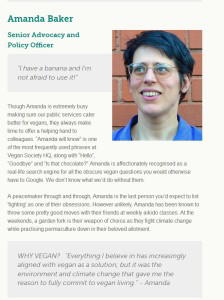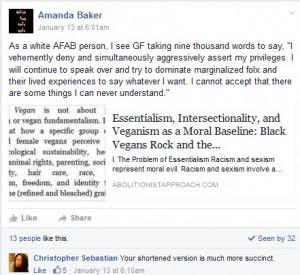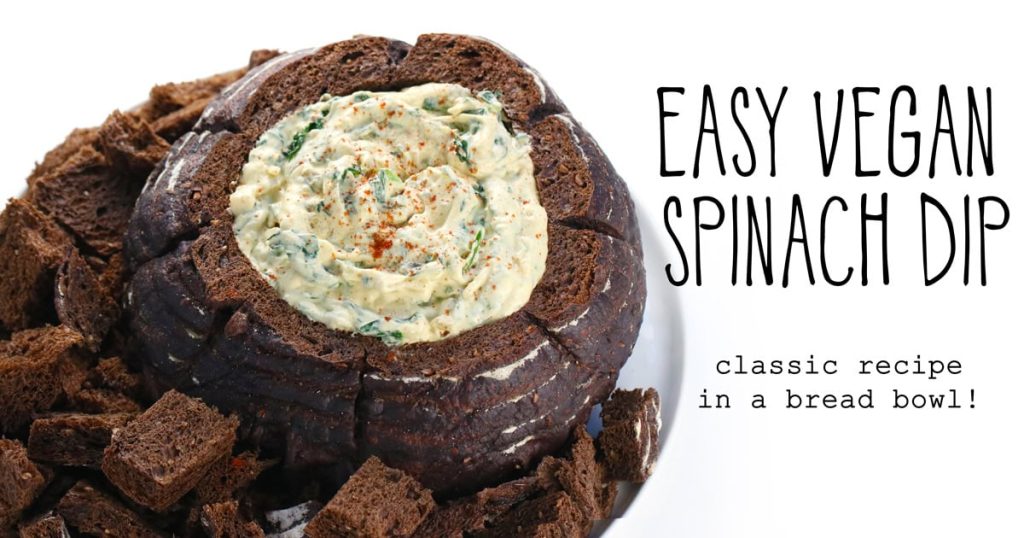In my essay on “intersectionalist vegans,” I carefully documented explicit and overt speciesiesm on the part of a number of figureheads in the intersectionalist movement. Whatever else anyone wants to say, it is crystal clear that, for example, Breeze Harper, a member of the Board of Black Vegans Rock (BVR), rejects veganism as a moral imperative. Indeed, Harper refers to the idea that we are required morally to be vegan as “vegan fundamentalism”—the very same expression used by all of the large corporate charities to trash veganism as a moral imperative. But it is also crystal clear that BVR, as an organization, rejects the idea that veganism is a moral imperative.
An interesting response to my essay has come from Amanda Baker, Senior Advocacy and Policy Officer of The Vegan Society.
Click to enlarge.
Amanda posted comments on my essay. For example, she stated:
As a white AFAB person, I see GF taking nine thousand words to say, “I vehemently deny and simultaneously aggressively assert my privileges. I will continue to speak over and try to dominate marginalized folx and their lived experiences to say whatever I want. I cannot accept that there are some things I can never understand
Here is a screenshot of that comment:
Click to enlarge.
Another comment from Amanda Baker:
To put it yet another way, GF seems to be saying, “I cannot accept that as a white male professor, I live daily with huge benefits from the unequal relay race of history. I cannot accept that I need to sit down and no longer be dominant, so that marginalized folx can act.
Here is a screenshot of that comment:
Click to enlarge.
Let me say that I have the highest regard for Donald Watson, who co-founded The Vegan Society in 1944. Indeed, I wrote the entry on Watson for the Cultural Encyclopedia of Vegetarianism and, more recently, discussed Watson in a forthcoming Oxford University reference book on animal ethics. But I certainly—and unfortunately—have a very different view of veganism from the people who currently run the Society.
For example, back in 2011, I expressed an objection to their taking paid advertisements for non-vegan restaurants in their magazine. In particular, I objected to The Vegan Society having an advertisement in their magazine that described a non-vegan restaurant as “A Haven of Peace & Inspiration” as I did not think that the animals, who were exploited for all of the dairy products and eggs that were served at that restaurant, would agree. There was more discussion here. The result: I was banned from participating in the online forum of The Vegan Society.
In 2014, I objected to The Vegan Society’s “You Don’t Have to Be Vegan” campaign. I applied to be a member of The Vegan Society so I could participate in a meeting about the “You Don’t Have to Be Vegan” campaign. My application was denied because, according to CEO Jasmijn de Boo, I brought The Vegan Society “into disrepute.”
Also in 2014, I expressed astonishment that Vegan Society “Ambassador” Fiona Oakes claimed that veganism is not “for everyone, I’m saying that it’s not probably for very many people. . .”
In 2014, I wrote about the involvement of The Vegan Society with “sustainable” animal agriculture and their partnering with vivisectors in campaigns.
In sum, I believe that The Vegan Society has lost its way and has little relationship to the progressive moral vision that inspired Donald Watson. The Vegan Society, in my view, does not see veganism as a matter of justice for nonhuman animals.
But Amanda Baker’s comments on my essay on what is called “intersectional veganism,” (I regard it as nothing more than another version of speciesism and essentialism) takes my disagreement with The Vegan Society to a qualitatively different level.
Amanda is taking the position that arguing that veganism is a moral baseline involves white privilege and male privilege. She is saying that it is racist and sexist to disagree with people of color and women who reject veganism as a moral baseline.
That is breathtaking.
Amanda apparently agrees with Breeze Harper, who rejects the idea of objective moral principles altogether (at least as they apply to nonhumans), espousing a form of moral relativism, and maintains that veganism is a matter of the “who you are space.” Indeed, Amanda states:
I’m based in the UK, but I cannot recommend too highly the work of Dr A B Harper including the Sistah Vegan Project.
Here’s a screenshot of that comment:
Click to enlarge.
As I noted in my essay, in Sistah Vegan, Harper characterizes veganism as a moral imperative as “vegan fundamentalism.”
Amanda rejects the idea of veganism as any sort of moral baseline. And given that Amanda is the Senior Advocacy and Policy Officer of The Vegan Society, it is no surprise that The Vegan Society rejects veganism as a moral imperative, which it pretty clearly does.
But it is rather shocking that Amanda would take the further step and say that veganism as a moral baseline is a matter of white male privilege. I am sure that many members of The Vegan Society believe that veganism is a moral imperative. I wonder how they will feel to learn that their views are not only not shared by The Vegan Society, but that, according to the Senior Advocacy and Policy Officer of The Vegan Society, their views are racist and sexist.
That position is troubling for several reasons. First, as Amanda acknowledges, she is a white female. So it’s a bit puzzling as to how she can make such a pronouncement in the first place on behalf of people of color. Second, there are many people of color and women whose advocacy is framed by the Abolitionist Approach and who maintain that veganism is a moral imperative. Therefore, it’s a bit unclear as to how veganism as a moral baseline can be a matter of white male privilege.
Perhaps Amanda agrees with other essentialists who, as we have seen above, think that people of color and women who embrace the Abolitionist Approach to guide their advocacy can be dismissed, ignored, or declared to be “tokens.” If she does agree with them, then I am shocked that the Senior Advocacy and Policy Officer of The Vegan Society would regard people of color and women in that way.
If she does not agree with them, then I am not all clear as to what she means by saying that my position that veganism is a moral imperative is a matter of white male privilege.
There’s really no good way to interpret her position.
If she is saying that women and people of color who agree with my position don’t count, that’s obviously problematic. If she is saying that veganism as a moral imperative is not a matter of white male privilege as long as white males aren’t taking that position, then it not only renders the moral obligation incoherent but also involves the most insidious sort of identity politics—moral principles are valid or not valid dependent only on who is espousing the principles and not what it is that they are espousing. And the who is linked to race and sex or gender alone.
Or perhaps Amanda simply does not see veganism as a moral imperative concerning justice for nonhuman animals. From this statement from The Vegan Society website, Amanda seems focused on the environment and climate change:
WHY VEGAN? “Everything I believe in has increasingly aligned with vegan as a solution; but it was the environment and climate change that gave me the reason to fully commit to vegan living.” – Amanda
But even if Amanda does not think that veganism is a moral baseline, you would think that she would at least be mindful that many people, probably including members of The Vegan Society, do regard veganism as a moral imperative, and that she would not think it a good idea to slag them off as racists and sexists.
Or perhaps Amanda was just plain pandering to folks (or “folx”) and was not acting out of any principle. Perhaps Amanda saw this controversy as an opportunity to attack me in an ad hominem way because I have been critical of The Vegan Society.
As I am not sure what why Amanda is taking this position, or what the position of The Vegan Society is concerning such troubling statements made by its Senior Advocacy and Policy Officer, I have written to The Vegan Society to ascertain exactly what is going on. Despite several emails to Jasmijn de Boo, CEO of The Vegan Society, I have received no reply. I was informed by Bob Linden of Go Vegan Radio that Bob invited Jasmijn and Amanda to come onto his show to discuss this matter. As far as I am aware, Bob has not had a reply.
In any event, one of the BVR Board members, Christopher-Sebastian McJetters (who, when I spoke with him, indicated that he preferred to be called “Sebastian”), weighed in on one of Amanda’s comments. In response to Amanda’s claim that my essay was merely a 9,000 word expression of my “privileges,” Sebastian said that he thought that Amanda’s “shortened version is much more succinct.”
Here’s a screenshot:
Click to enlarge.
A preliminary question of interest is why Amanda, a white, middle-class, highly educated person has a position that should not automatically be dismissed by Sebastian as reflecting her privileges. Let’s put that to one side for the time being.
I was under the impression that Sebastian agreed that veganism was a moral imperative. But if that were the case, he would not have said that my position was merely an expression of my privileges as he would share the position. He would have agreed that BVR and some of his colleagues on the BVR Board did, indeed, take positions that smacked of speciesism, and he would have been concerned about that.
I was, however, apparently mistaken and it appears as though Sebastian, like Harper, Aph Ko, and others involved in BVR, does not believe that veganism is a moral imperative. In that case, how can my position merely be a matter of my “privileges” because there are plenty of people of color who share my position. Sebastian may disagree with all of us, but there is nothing about the anti-speciesist position that veganism is a moral baseline that is a matter of privileges.
And why is it that a position that we cannot morally justify exploiting the most vulnerable victims is a matter of my white or my male privileges?
We ought all to check our privileges but the ultimate question is whether our privileges have resulted in our taking an unjust position. I would suggest that the privileged position in this context is the one that says that humans, by virtue of their privilege as humans, can exploit nonhumans and can reject veganism as a moral imperative. In my view, that is an unjust position.
Sebastian is one of the facilitators of the Intersectional Justice Conference that is being sponsored by the Humane Society of the United States. Why is my criticism of that a matter of my privileges? As I discuss in my essay, HSUS is an organization that disavows wanting people to go vegan, supports animal agriculture, sponsors events at which animals are served as food, and is among the most prominent—if not the most prominent—proponent of “happy exploitation.” Again, it would seem that the “privileged” position is the one that celebrates the support by HSUS.
I respect the right of anyone or any group to promote whatever version of new welfarism they want to promote. I respect that they are free to reject veganism as a moral baseline in favor of Breeze Harper’s “who you are space” brand of moral relativism or any other position that falls short of veganism as a moral baseline. What I will not respect is the cheap threat that if I or others—including people of color and women—criticize others for rejecting veganism as a moral baseline, we will be called “racist” or “sexist” or whatever aspersion those who use defamation choose to cast because they are unable or unwilling to deal with substance.
That strategy is not going to work.
I recognize that The Vegan Society has departed far from the vision of Donald Watson but it is positively breathtaking that Amanda Baker, Senior Advocacy and Policy Officer of the Society, maintains that promoting veganism as a moral imperative is racist and sexist. And it’s very disappointing that board members of Black Vegans Rock agree with her.
Bottom line: If animals matter morally, veganism is the only rational and morally sound position to take. There’s really no good counterargument, which, of course, is why there is the name calling. The idea that it is a matter of white male privilege to maintain that we cannot justify direct participation in the exploitation of nonhuman animals is bizarre beyond belief. But, at least, we all know where we stand.
With respect to animals, we all enjoy the most absolute of privileges. We hold their fate completely in our hands. We need a clear, unified, and consistent voice to effect the complete dismantling—the abolition—of the mechanisms of animal exploitation. And that will only come from what we say and do—no matter who we are.
Here’s a short summary for Amanda Baker and Christopher-Sebastian McJetters because she was complaining that the original essay was 9,000 words long and Sebastian has stated his preference for succinct expositions. And this essay is 2500 words long.
Bear with me, Amanda and Sebastian, it’s just two short points:
First, it is beyond shameful that the Vegan Society, founded by Donald Watson in 1944, employs as Senior Advocacy and Policy Officer someone who maintains that promoting veganism as a moral imperative is “racist” and “sexist.” Poor Donald Watson must be spinning—not turning, spinning—in his grave.
Second, because animals matter morally any use of animals exclusively as resources cannot be morally justified. The moral status of animals as nonhuman persons requires that we go vegan. One is either vegan or one is engaging directly in the exploitation of nonhumans. There is no third choice.
Anyone who disagrees with that—irrespective of their race, sex, gender, ability, class, or any other attribute—is morally in error.
That is 117 words. I hope that’s okay.
Here’s an even shorter one: Nonhumans don’t care about the race, sex, gender, ability, class, etc. of those who exploit them.
That’s 16 words.
**********
If you are not vegan, please go vegan. Veganism is about nonviolence. First and foremost, it’s about nonviolence to other sentient beings. But it’s also about nonviolence to the earth and nonviolence to yourself.
If animals matter morally, veganism is not an option — it is a necessity. Anything that claims to be an animal rights movement must make clear that veganism is a moral imperative.
Embracing veganism as a moral imperative and advocating for veganism as a moral imperative are, along with caring for nonhuman refugees, the most important acts of activism for you can undertake.
Groups that promote “happy exploitation” of any sort are part of the problem and not part of the solution.
THE WORLD IS VEGAN! If you want it.
Learn more about veganism at www.HowDoIGoVegan.com.
Gary L. Francione
Board of Governors Distinguished Professor
Katzenbach Scholar of Law and Philosophy
Rutgers University School of Law
©2016 Gary L. Francione
The post The Vegan Society Senior Officer of Advocacy and Policy Rejects Veganism as a Moral Baseline appeared first on Animal Rights: The Abolitionist Approach.







